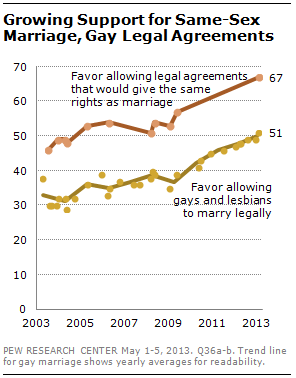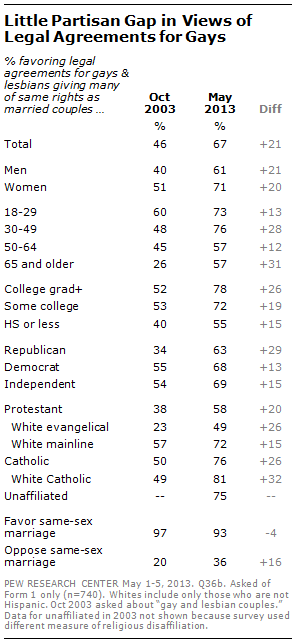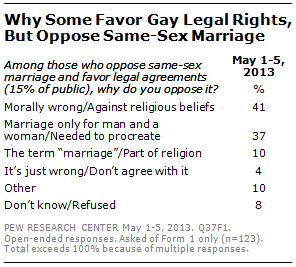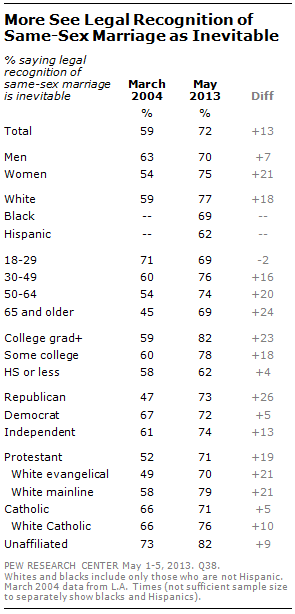
More on Same-Sex Marriage Growing Support for Gay Marriage: Changed Minds and Changing Demographics
Support for same-sex marriage has edged above 50% for the first time in a Pew Research Center survey. Currently, 51% favor gays and lesbians marrying legally, while 42% are opposed. In March, 49% favored same-sex marriage and 44% were opposed.
The long-term trend toward support for gay marriage exists across most segments of the American population, though significant divides persist. People younger than 30 support gay marriage by about two-to-one, while those age 50 and older are divided. There is far more support for gay marriage among college graduates than among those who never attended college. And there continues to be a substantial difference of opinion regionally, with more support in the Northeast than in other regions.

As support for same-sex marriage has increased, so too has the percentage favoring legal agreements for gays and lesbians that would give them many of the same rights as married couples. Currently, 67% favor gays and lesbians being allowed to enter legal agreements that would give them many of the rights of married couples, while just 28% are opposed. Support for legal agreements crossed the 50% threshold in 2005, but a decade ago, opinion was evenly divided (46% favor, 47% oppose).

Like the rise in support for same-sex marriage, growing support for providing the same legal rights to gay and lesbian couples has occurred among most demographic and partisan groups. But some of the most dramatic increases have occurred among groups in which there continues to be broad opposition to gay marriage, including Republicans, older Americans and white evangelical Protestants.
Currently, 63% of Republicans favor legal agreements for gays and lesbians that would give them many of the rights of married couples, up from just 34% a decade ago. In the current survey, Republicans are nearly as likely as Democrats (68%) to favor legal agreements for gays and lesbians that give them similar rights to married couples. In 2003, there was a 21-point gap in these opinions.
Over the past decade, support for legal agreements for gays and lesbians has about doubled among people 65 and older (from 26% to 57%) and white evangelical Protestants (from 23% to 49%).
And while support for legal agreements continues to be virtually unanimous among all who support same-sex marriage, it has increased by 16 points – from 20% to 36% among those who oppose same-sex marriage.
Overall, 15% of Americans say they support legal agreements that would give gay and lesbian couples the same rights as married couples, but oppose same-sex marriage. When

asked to explain in their own words why they oppose gay marriage, 41% cite moral concerns and religious beliefs as the reason. As one 34-year-old woman put it: “For me, I think it’s a religious and moral issue. They shouldn’t be discriminated against but it’s important to preserve what marriage is morally.”
In addition, 37% holding these views say that marriage is only for a man and a woman, or that the main purpose of marriage is procreation. “I am old-fashioned. I believe marriage is between a man and a woman,” said a 79-year-old woman. Another 10% emphasize the term “marriage” itself, such as this 64-year-old man: “Marriage is a religious institution that belongs to religion, not the government.”
Is Gay Marriage ‘Inevitable’?

Along with rising support for gay marriage is the increasing sense that the legal recognition of gay marriage is inevitable: 72% of Americans now say this, up from 59% in a 2004 Los Angeles Times survey.
The rising sense of inevitability is most notable among some of the groups that tend to be the least supportive of gay marriage itself. The share of Republicans who see gay marriage as inevitable rose from 47% to 73% over the past nine years. While there was a steep partisan divide in 2004, now there is none: Republicans are just as likely as Democrats (72%) and independents (74%) to see legal recognition of same-sex marriage as inevitable.
Similarly, in 2004 71% of 18-29 year-olds felt that gay marriage was inevitable, compared with 45% of those age 65 and older. Today there is no such divide: 69% of both the youngest and oldest hold this view.
The same pattern holds along religious lines: the share of white evangelical Protestants who see gay marriage as inevitable rose from 49% to 70%, and there is less of a difference across religious lines today than in 2004.
One divide that exists on this opinion is by education. Eight-in-ten adults with at least some college believe same-sex marriage is inevitable, compared to about six-in-ten (62%) of those with no college experience. This gap did not exist in 2004, when about six-in-ten people of all educational levels believed this.




